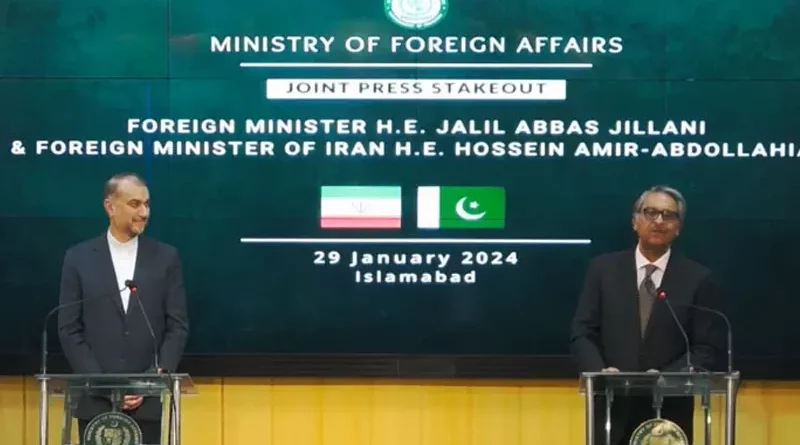Iranian FM says ‘terrorists’ in Pak-Iran border areas supported by ‘third countries’
Iranian Foreign Minister Hossein Amir-Abdollahian Monday hinted at the involvement of “third countries” behind rising terrorism in the border region between Pakistan and Iran.
“There is no doubt that the terrorists located in the common border regions and areas of Iran and Pakistan are led and supported by third countries,” he said adding that the terrorists never favour any good actions in line with the benefits and interests of the Pakistani and Iranian governments and nations.
The Iranian FM’s statement came during a joint presser with his counterpart, Pakistan’s caretaker Foreign Minister Jalil Abbas Jilani, during his Islamabad visit today.
Addressing the presser, both ministers said that they respected each other’s sovereignty and territorial integrity and resolved to expand security cooperation, stepping up efforts to mend ties after tit-for-tat missile strikes this month.
The two ministers said that both countries held talks in the Pakistani capital days after their military tensions raised alarm about wider instability in the region.
Jilani said that both Iran and Pakistan can resolve misunderstandings fairly quickly. The two countries also agreed to fight terrorism in their respective areas and allay each other’s concerns, he added.
Abdollahian said the two countries have a good understanding, adding that there have never been territorial differences or wars between Iran and Pakistan.
Iran’s President Ebrahim Raisi would soon visit Pakistan, Abdollahian added.
Meanwhile, Jilani said that the threats of terrorism pose a common challenge to both countries.
“Pakistan and Iran have agreed to adopt collective and collaborative approaches to confront this menace by fully leveraging the robust institutional mechanisms which already exist between our two countries,” he added.
Jilani further maintained that respect for sovereignty and territorial integrity remains an immutable and foundational principle of this cooperation. “We have also agreed to prioritise economic uplift and development of our border areas.”
Speaking about FM Amir-Abdollahian’s visit, Jilani said: “His visit at such short notice testifies to the deep commitment of both sides to further strengthen and solidify the fraternal ties between Pakistan and Iran.”
He added that the relationship between Pakistan and Iran is steeped in shared religion, history, culture and geography. “This is a relationship which is also underpinned by strong bonds of amity and brotherhood.”
He spoke about conducting a detailed and comprehensive exchange of views with his counterpart on all issues of interest to both countries. Our discussions were marked by convergences on all issues of mutual interest.
“We recognised that the close relationship between Iran and Pakistan is not only imperative for the shared prosperity and development of our two people, but also an important source of stability for the region,” Jilani said.
“Pakistan’s security is a priority for us,” said Amir-Abdollahian, addressing the media during the presser.
The Iranian FM said he considers the people of Iran and Pakistan to be one nation.
Tensions between the two countries rose after the missile strikes, with Pakistan recalling its ambassador to Tehran and not allowing his counterpart to return to Islamabad, as well as cancelling all high-level diplomatic and trade engagements.
But efforts were swiftly made to lower the temperature, with the envoys asked to return to their posts and Abdollahian invited for talks.
The two Muslim nations have had a history of rocky relations, but the missile strikes were the most serious incidents in years.
Islamabad said it hit bases of the militants Baloch Liberation Front and Baloch Liberation Army, while Tehran claimed it struck militants from the Jaish al-Adl group.

